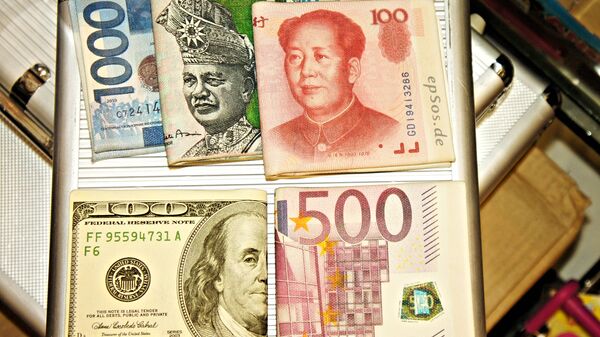MOSCOW, November 24 (Sputnik) — The euro nearly dipped to a two-year low against the dollar during Monday’s trading, while in Asia the European currency hardly recovered from Friday’s fall as investors anticipated cheaper euro liquidity after ECB head Mario Draghi hinted that coherent regulatory easing action is coming.
The euro sell-off continued Monday in Asian markets as the European currency slipped down to $1.2359, near a two-year low of $1.2358, which the euro had hit earlier this month. The euro depreciated against the yen to ¥145.86, resurging somewhat to ¥146.183 by 3 pm, compared to ¥147.81 earlier today, according to Bloomberg.
"The market appears to be pricing in some expectation of sovereign quantitative easing at the next ECB meeting in two weeks," Greg Moore of RBC Capital Markets told Reuters.
Investors and traders are playing against the euro as ECB easing seems more likely after a commentary made by Mario Draghi who announced Friday that the regulator "will use all means available to us, within our mandate, to return inflation towards our objective – and without any undue delay." Among the possible measures of the European monetary easing are US Fed-style bond purchases, dubbed ‘quantitative easing’ across the ocean. Such measures provide cheaper money liquidity to the economy, boosting inflation and spurring economic growth.
Recently, similar measures have been implemented in Japan, which resulted in the depreciation of the yen. While ECB easing, investors suggest, will trigger a slump in the euro’s FX rate, such considerations have already initiated euro selloffs before any actual measures are implemented.
Later today the markets anticipate a report on the German business climate, which is defined in the wider Eurozone situation. The findings of the report, prepared by Munich-based think-tank Ifo, will reflect on the euro FX rate, depending on whether or not the analysts see enough reasons for stimulus.
"The unexpected sharp drop last Friday indicates that a temporary top is in place… The immediate pressure is on the downside and the current weakness could extend towards the strong support at 1.2290 before a rebound can be expected," Singapore-based United Overseas Bank said as quoted by AFP.
The ECB decision on easing may be triggered by the data anticipated on 28 November. The inflation in Eurozone data will likely show the weakest consumer price growth since 2009, Bloomberg suggests. The ECB stimulus debate will take place shortly thereafter on December 4.
“The stakes are high and the risks are asymmetric,” Frederik Ducrozet of Paris-based Credit Agricole told Bloomberg. “A drop in inflation, even a small one, could push the ECB to do something more in December. On the other hand if there is an upside surprise, that buys them time.”
Inflation in the Eurozone is anticipated to decrease to 0.3% from the current 0.4%, while unemployment in October is likely to remain unchanged at 11.5%, with economic confidence decreasing.
There is a firm opposition to monetary easing within the Eurozone in the most advanced nations like Germany and Netherlands, requiring tighter monetary conditions, while the abundance of cheaper euro-denominated liquidity will benefit the nations of Europe’s periphery like Greece or Spain. Dutch central bank head Klaas Knot said Saturday he is “rather skeptical” of the looming QE-analogue. Bundesbank President Jens Weidmann and ECB Executive Board member Sabine Lautenschlaeger, a former Bundesbank official, are among other policy makers opposed to such a move.
While the Eurozone’s main regulator is still working out the best policy, the EU economy is cautiously steady. Oil consumption is declining dramatically on flat growth, as the broader use of substitutes like coal, as well as nuclear and green energy, increases. The Eurozone’s manufacturing Purchasing Managers’ Index (PMI) is 50.4, according to Markit data, which indicates moderate expansion in the sector, while composite PMI is 51.4. At this point, there is no reason for significant euro FX rate fluctuations expected for the ECB decisions.



